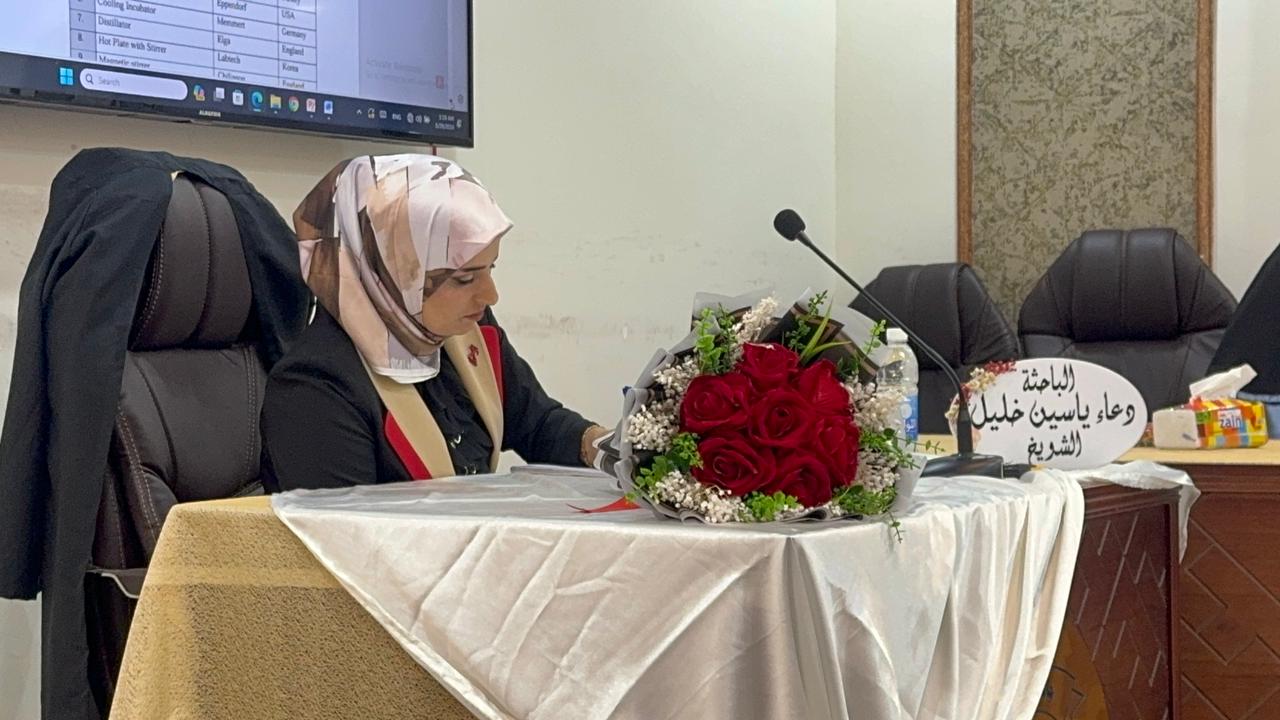
Discussion of the master’s thesis by the student (Doaa Yassin Khalil)
The public discussion was held by the master’s student (Doaa Yassin Khalil) from the Biology Department, College of Science - Anbar University, on Wednesday, May 29, 2024, at Jaber Bin Hayyan Hall in the College of Science. for his tagged thesis
" Evaluation of anti-oxidant, anti-inflammatory, anticancer, antimicrobial, and genotoxic activities of rosemary essential oils "
The discussion committee consisted of:
|
Anbar University - College of Science - President |
Prof. Dr. Sufyan Muhammad Shartouh |
|
Anbar University - College of Science -Member |
Prof. Dr. Mays Imad Ahmed |
|
Anbar University - College of Science - Member |
Assist. Prof. Dr. Omar Muhammad Hassan |
|
Anbar University - College of Science - member and supervisor |
Assist. Prof. Dr. Ahmed Sami Farhan |
This study aimed to determine the chemical composition of Rosmarinus officinalis essential oil by GC/MC, and the antibacterial activity was screened using the Agar disc diffusion method against Gram positive and negative bacterial strains, including Escherichia coli, Staphylococcus aureus, Pseudomonas aeruginosa, and Klebsiella pneumoniae, and the minimum inhibitory concentration (Minimum inhibitory concentration) of rosemary essential oil was determined. The rosemary essential oil showed good antimicrobial activity against all bacterial isolated. Minimum inhibitory concentration values were ranged from 1.56 to 25 mg/L. According to the Minimum inhibitory concentration results, Pseudomonas aeruginosa was inhibited more than Staphylococcus aureus. the essential oil's ability to scavenge free radicals was tested by the Dpph assay. rosemary essential oil presented a satisfactory free radical scavenging rate of antioxidant activity of 88.53% compared to ascorbic acid of 92.70%. The potential anti-inflammatory role of the oil in Lipopolysaccharide-stimulated RAW 264.7 macrophages was also examined by inhibiting the expression of tumor necrosis factor (Tumor necrosis factor alpha) in mice. Essential oils showed promising anti-inflammatory activity by significantly lowering the expression level of Tumor necrosis factor alpha.
The cytotoxicity of different concentrations of rosemary essential oil for 48 h was also studied with human lung cancer cells (A549) compared to normal epithelial cells (MCF10) using the MTT assay. The essential oils showed high cytotoxicity on A549 cell lines (IC50 = 500 μg/mL). At the same time, it had no significant toxic effect on normal cells. The ability of rosemary essential oil to induce apoptosis in lung cancer cells was studied using acridine orange and ethidium bromide staining. Therefore, rosemary essential oil could be a potential candidate as a therapeutic agent in the treatment of cancer. This means that it could be used as a natural active ingredient in drugs that fight inflammation, cancer, or free radicals. Therefore, rosemary essential oil could be a potential candidate as a therapeutic agent in the treatment of cancer. Together, these results showed that rosemary essential oil has a wide range of excellent biological effects. This means that it could be used as a natural active ingredient in drugs that fight inflammation, cancer, or free radicals.




